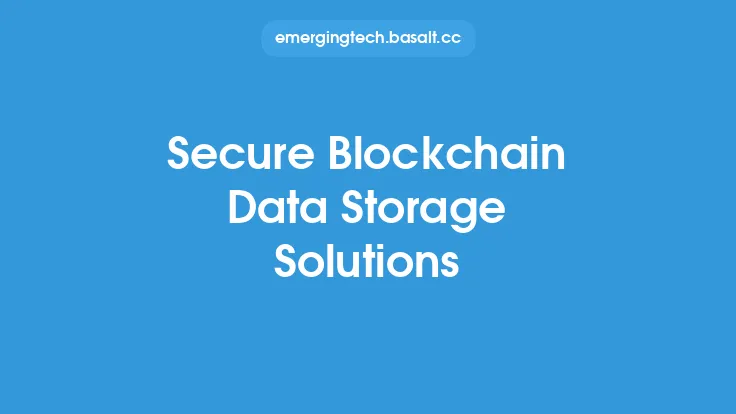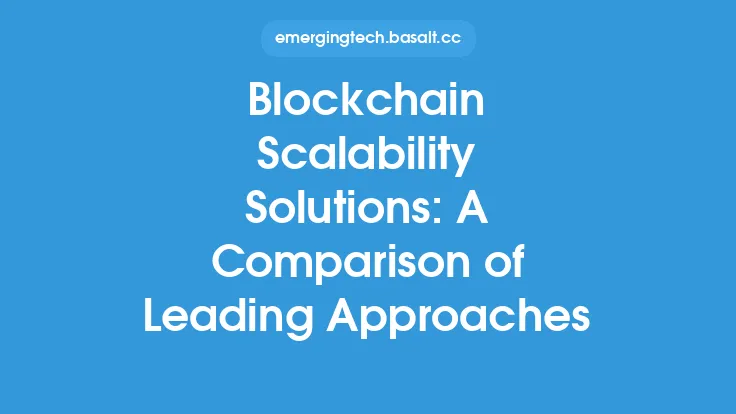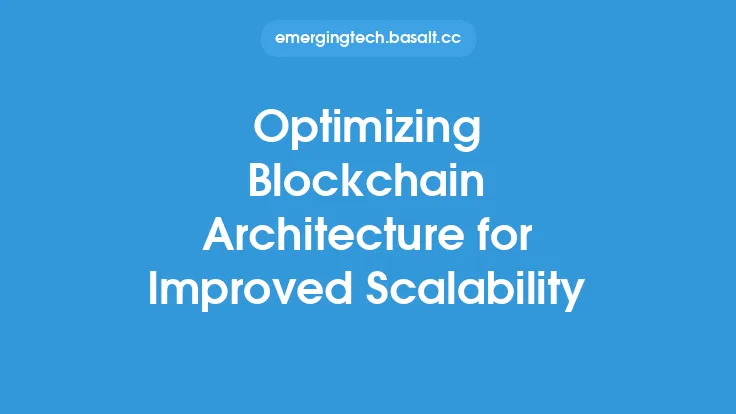The blockchain ecosystem has experienced tremendous growth over the years, with an increasing number of users, transactions, and applications being built on top of it. However, this growth has also led to significant challenges, particularly when it comes to data storage. The decentralized nature of blockchain technology means that all nodes on the network must store a copy of the entire blockchain, which can lead to significant storage requirements. As the blockchain grows, so does the amount of data that needs to be stored, making it essential to find efficient solutions for scalability.
Introduction to Blockchain Data Storage
Blockchain data storage refers to the process of storing and managing data on a blockchain network. This data can include transaction records, smart contracts, and other types of information. The way data is stored on a blockchain can have a significant impact on the network's scalability, security, and performance. Traditional blockchain data storage solutions often rely on a centralized approach, where data is stored on a single node or a small group of nodes. However, this approach can lead to scalability issues, as the amount of data grows exponentially with the number of users and transactions.
Challenges of Blockchain Data Storage
One of the primary challenges of blockchain data storage is the issue of scalability. As the blockchain grows, the amount of data that needs to be stored also increases, leading to significant storage requirements. This can lead to a number of problems, including increased latency, reduced network performance, and higher costs. Another challenge is the issue of data fragmentation, where data is split across multiple nodes, making it difficult to access and manage. Additionally, blockchain data storage solutions must also ensure the security and integrity of the data, which can be a complex task, especially in a decentralized environment.
Decentralized Data Storage Solutions
Decentralized data storage solutions have emerged as a promising approach to addressing the challenges of blockchain data storage. These solutions allow data to be stored across a network of nodes, rather than on a single centralized node. This approach can help to improve scalability, as the storage requirements are distributed across the network, rather than being concentrated on a single node. Decentralized data storage solutions can also help to improve security, as data is split into smaller chunks and stored across multiple nodes, making it more difficult for hackers to access.
InterPlanetary File System (IPFS)
One example of a decentralized data storage solution is the InterPlanetary File System (IPFS). IPFS is a peer-to-peer network that allows users to store and share files in a decentralized manner. Files are split into smaller chunks and stored across a network of nodes, rather than on a single centralized node. This approach can help to improve scalability, as the storage requirements are distributed across the network, rather than being concentrated on a single node. IPFS also uses a content-addressed approach, where files are identified by their content, rather than their location. This approach can help to improve security, as files are tamper-proof and can be verified by any node on the network.
Swarm
Another example of a decentralized data storage solution is Swarm. Swarm is a decentralized storage platform that allows users to store and share files in a secure and scalable manner. Files are split into smaller chunks and stored across a network of nodes, rather than on a single centralized node. This approach can help to improve scalability, as the storage requirements are distributed across the network, rather than being concentrated on a single node. Swarm also uses a incentivized approach, where nodes are rewarded for storing and sharing files. This approach can help to improve the security and integrity of the data, as nodes have a financial incentive to store and share files in a secure and reliable manner.
Filecoin
Filecoin is another decentralized data storage solution that has gained significant attention in recent years. Filecoin is a decentralized storage network that allows users to store and share files in a secure and scalable manner. Files are split into smaller chunks and stored across a network of nodes, rather than on a single centralized node. This approach can help to improve scalability, as the storage requirements are distributed across the network, rather than being concentrated on a single node. Filecoin also uses a token-based approach, where nodes are rewarded with tokens for storing and sharing files. This approach can help to improve the security and integrity of the data, as nodes have a financial incentive to store and share files in a secure and reliable manner.
Benefits of Decentralized Data Storage Solutions
Decentralized data storage solutions offer a number of benefits, including improved scalability, security, and performance. By distributing storage requirements across a network of nodes, decentralized data storage solutions can help to reduce latency and improve network performance. Additionally, decentralized data storage solutions can help to improve security, as data is split into smaller chunks and stored across multiple nodes, making it more difficult for hackers to access. Decentralized data storage solutions can also help to improve the integrity of the data, as files are tamper-proof and can be verified by any node on the network.
Conclusion
In conclusion, blockchain data storage is a critical component of the blockchain ecosystem, and efficient solutions are needed to address the challenges of scalability, security, and performance. Decentralized data storage solutions, such as IPFS, Swarm, and Filecoin, offer a promising approach to addressing these challenges. By distributing storage requirements across a network of nodes, decentralized data storage solutions can help to improve scalability, security, and performance. As the blockchain ecosystem continues to grow and evolve, it is likely that decentralized data storage solutions will play an increasingly important role in enabling the widespread adoption of blockchain technology.





